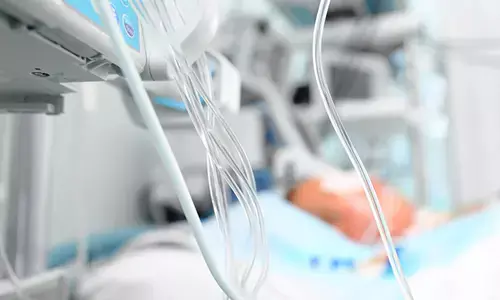- Home
- Medical news & Guidelines
- Anesthesiology
- Cardiology and CTVS
- Critical Care
- Dentistry
- Dermatology
- Diabetes and Endocrinology
- ENT
- Gastroenterology
- Medicine
- Nephrology
- Neurology
- Obstretics-Gynaecology
- Oncology
- Ophthalmology
- Orthopaedics
- Pediatrics-Neonatology
- Psychiatry
- Pulmonology
- Radiology
- Surgery
- Urology
- Laboratory Medicine
- Diet
- Nursing
- Paramedical
- Physiotherapy
- Health news
- Fact Check
- Bone Health Fact Check
- Brain Health Fact Check
- Cancer Related Fact Check
- Child Care Fact Check
- Dental and oral health fact check
- Diabetes and metabolic health fact check
- Diet and Nutrition Fact Check
- Eye and ENT Care Fact Check
- Fitness fact check
- Gut health fact check
- Heart health fact check
- Kidney health fact check
- Medical education fact check
- Men's health fact check
- Respiratory fact check
- Skin and hair care fact check
- Vaccine and Immunization fact check
- Women's health fact check
- AYUSH
- State News
- Andaman and Nicobar Islands
- Andhra Pradesh
- Arunachal Pradesh
- Assam
- Bihar
- Chandigarh
- Chattisgarh
- Dadra and Nagar Haveli
- Daman and Diu
- Delhi
- Goa
- Gujarat
- Haryana
- Himachal Pradesh
- Jammu & Kashmir
- Jharkhand
- Karnataka
- Kerala
- Ladakh
- Lakshadweep
- Madhya Pradesh
- Maharashtra
- Manipur
- Meghalaya
- Mizoram
- Nagaland
- Odisha
- Puducherry
- Punjab
- Rajasthan
- Sikkim
- Tamil Nadu
- Telangana
- Tripura
- Uttar Pradesh
- Uttrakhand
- West Bengal
- Medical Education
- Industry
Melatonin supplementation improves blood sugar but not ICU complications in critically-ill: Study

Iran: Melatonin supplementation positively affects blood sugar and also insulin resistance (IR) to some extent in critically-ill patients, however, it does not improve ICU complications, reveals a recent study. The study appears in the Caspian Journal of Internal Medicine.
In critically ill patients, hyperglycemia is shown to be associated with increased mortality and morbidity. Currently, there is no evidence that melatonin could improve stress-induced hyperglycemia (SIH). In the study, Fahimeh Naderi-Behdani, Department of Clinical Pharmacy, Faculty of Pharmacy, Mazandaran University of Medical Sciences, Sari, Iran, and colleagues, therefore aimed to evaluate the effect of melatonin on blood sugar and insulin resistance in critically ill patients.
For this purpose, 104 critically-ill patients with SIH received either melatonin (6 mg BD for 3 days) or a placebo. The researchers evaluated changes in blood sugar, IR indices including homeostasis model assessment for insulin resistance and homeostasis model assessment adiponectin (HOMA-AD) ratios, Glasgow coma scale (GCS) on the 4th day of melatonin prescription. Changes in ventilator dependency and delirium were considered on the 7th day of study. They also compared mortality and intensive care unit (ICU) stay between groups.
Salient findings of the study were as follows:
- On day 4, patients in the melatonin group had significantly lower blood glucose and HMOA-IR level compared with the placebo group whereas the HOMA-AD level did not differ significantly from the placebo group.
- There was no significant difference in GCS level at this time between groups.
- On day 7, melatonin could not improve ventilator dependency and delirium significantly and also could not reduce mortality and ICU stay in comparison with placebo.
To conclude, 12 mg melatonin, oral daily for 3 days improved fasting blood sugar (FBS) and somehow insulin resistance in critically ill patients with SIH, though it could not significantly improve ICU complications.
Reference:
Naderi-Behdani F, Heydari F, Ala S, Moradi S, Abediankenari S, Asgarirad H et al . Effect of melatonin on stress-induced hyperglycemia and insulin resistance in critically-ill patients: A randomized double-blind, placebo-controlled clinical trial. Caspian J Intern Med. 2022; 13 (1) :51-60; http://caspjim.com/article-1-2628-en.html
Dr Kamal Kant Kohli-MBBS, DTCD- a chest specialist with more than 30 years of practice and a flair for writing clinical articles, Dr Kamal Kant Kohli joined Medical Dialogues as a Chief Editor of Medical News. Besides writing articles, as an editor, he proofreads and verifies all the medical content published on Medical Dialogues including those coming from journals, studies,medical conferences,guidelines etc. Email: drkohli@medicaldialogues.in. Contact no. 011-43720751


